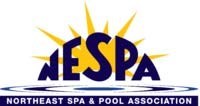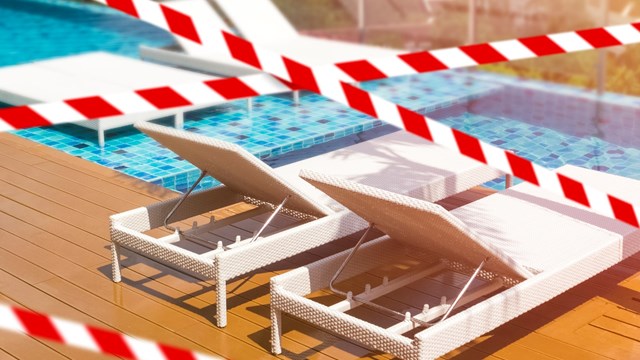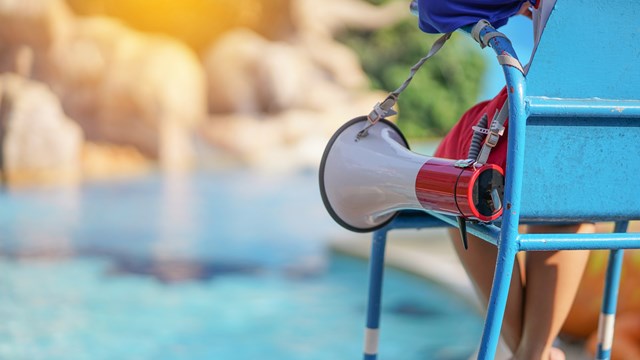
As the weather gets warmer with the arrival of spring, condo, HOA and co-op residents are getting the urge to cool off in their community swimming pool or relax in their heated clubhouse spa.
But before that can happen there’s a lot of behind-the-scenes preparation and maintenance that has to happen to get those pool facilities ready for the upcoming season. Here’s where the members of the Northeast Spa & Pool Association come into play. This professional organization known as NESPA represents the pool and spa industry in the Northeast.
NESPA exists to create a professional climate in which to advance commercial activities, and to address the current and future needs of the pool and spa industry.
“Our mission is to be the advocate for the swimming pool and hot tub industry in our four state region,” says Larry Caniglia, executive director of NESPA. “That involves everything from government relations to education, we do a lot of training and educational programs for members and non-members. We also produce an annual trade show which brings the buyers and sellers of our industry together.”
In the Beginning
In the late 1950s, members of the swimming pool industry in the northeast section of the U.S. banded together to form Northeast Swimming Pool Association (NESPA) to address their collective needs. According to its website, the organization was incorporated in 1958 and received its 501-C-6 status (as a trade association) from the IRS at that time. From the days of its founding, the organization has been continuously engaged in promoting and protecting its members and educating them and raising their levels of competency in all phases of business activity.
NESPA also serves as a source of product and safety information for the ultimate consumer. For over forty years, NESPA has been affiliated with the Association of Pool & Spa Professionals (APSP), first as that organization's Northeast chapter, and subsequently, as the administrator of the five APSP Chapters located in a territory known as Region I.
The organization is headquartered in Hamilton, N.J., and has five chapters which cover the following areas: Capital covering all of Upstate New York; Connecticut covering the Nutmeg State; the Long Island chapter for Long Island; the Metro NY/NJ covering Southern New York and Northern New Jersey; and Penn-Jersey covering Eastern Pennsylvania and Southern New Jersey. NESPA members include service companies, builders/installers, distributors, retail stores, manufacturer’s agents, manufacturers, independent pool and spa service companies and subcontractors.
NESPA is also the primary communicator to over 700 individual APSP members in the area. NESPA is the owner and producer of the Atlantic City Pool & Spa Show, one of the swimming pool industry's largest events which draws over 500 exhibitors and 10,000 attendees to Atlantic City for four days of educational, business and social activities each year. By attending the 70 plus seminars at the show, industry professionals are able to earn credit hours towards business or professional certifications. Seminars cover a wide-range of topics valuable to successful pool and spa management such as equipment troubleshooting, water chemistry, sales and marketing, just to name a few. The next show will be held January 29-31, 2013.
NESPA's other “trademark” activity is the Professional Training Institute, which began as Hands-On-Training Institute in 1984. PTI offers the industry's broadest, most comprehensive training programs designed to upgrade professional skills in building, service, management and retail operations. Members are able to work toward designations such as CSP (Certified Service Professional) and the CBP (Certified Building Professional) which are recognized by the industry and the public for achieving a high level of professional competence.
“The number one thing that we provide to the members and it is the number one reason that companies join NESPA is for the education and training piece. We have in some of our states; we have to have licensing which is required, to perform service on or to build a pool or a hot tub. In order to get that license, you need to have certain education requirements met. We provide those educational requirements, and if you are a member of NESPA, you that education either for free or at a greatly reduced price,” says Caniglia.
“We support licensing—it is good for the consumer and our industry. We want our members and non-members alike to be licensed. When you are talking about pools and hot tubs, you want them to be built and serviced properly. In order to make sure that happens you want the contractor to be an educated contractor and know what they are doing, follow the right building codes and the right standards,” he adds.
Educating the Public
Water is both friend and foe. A 2009 study at the University of South Carolina revealed that swimmers live longer than both walkers and runners. The study followed more than 40,000 men ages 20-90 for 32 years and showed that swimmers were 50 percent less likely to die. On the contrary, according to the Centers for Disease Control (CDC), drowning is the sixth leading cause of unintentional death for people of all ages and the second leading cause for children ages one to fourteen.
While enjoying pools and hot tubs, it is vital to ensure the safety of both adults and children. NESPA works to educate consumers about practices and equipment that can prevent drowning. NESPA offers checklists, diagrams, emergency procedures and many other helpful documents, and NESPA members are committed to discussing pool and spa safety with prospective buyers.
In partnership with the American Red Cross, National Recreation and Park Association and World Water Park Association, the Association of Pool and Spa Professionals (APSP) is delegating May 2012 as Water Safety Month. These organizations represent businesses and associations such as NESPA, which is also an affiliate of APSP. They are providing consumers and members with free resources to share to the community. On the national website, you can find event planning guides for a water safety fair, sample press releases, a radio script to broadcast on your local station, a lesson planning guide for a classroom, posters and a sample newspaper ad. Those interested can mix and match the guides which are versatile enough to be used in a classroom or at your monthly association meeting. More information can be found at:www.nationalwatersafetymonth.com
The VGB Act
One of the most important consumer safety measures to directly involve NESPA and its professionals came out of the tragedy involving a young girl named Virginia Graeme Baker.
In 2008, NESPA worked with Congress to enact the Federal Pool and Spa Act known as the Virginia Graeme Baker Pool and Spa Safety Act (VGB Act), which is named for the granddaughter of former Secretary of State James A. Baker III. In 2002 at the age of seven, Graeme Baker died in a spa after the powerful suction of a drain entrapped her under the water. Baker joined Nancy Baker, Graeme's mother, and Safe Kids USA in a three-year advocacy campaign to pass the legislation.
“All public pools, under the Act, were required to retrofit all drains and covers on public and commercial pools around the country to be fitted with VGB-complaint covers. They are anti-entrapment covers: it would prevent all five forms of entrapment: hair, mechanical such as jewelry, limb entrapment, body entrapment, or evisceration. These drain covers, which the industry spent years developing were required under this Act,” explains Caniglia. He continues that the act limited all manufacturers and distributors to only sell and distribute the new VGB-compliant covers. Additionally, pools that only had one drain were required to have a suction release system to prevent drowning and other pool and spa-related incidents.
The Northeast Spa & Pool Association is committed to educate its members and the public on the latest technology and water safety and provide education and resources so that public and residential pools and spas can be enjoyed safely when the hot weather arrives.
Maggie Puniewska is an editorial assistant at The New Jersey Cooperator.






Leave a Comment